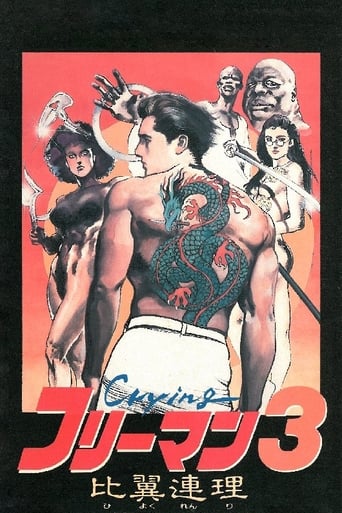

CRYING FREEMAN 3: SHADES OF DEATH, PT. 2 (1990) is the third OAV volume in the Japanese animated CRYING FREEMAN series, adapted from the popular manga about the not-so-cold-blooded killer of the title, written by Kazuo Koike and drawn by Ryoichi Ikegami, and is the first episode on Volume 2 of the DVD series released in 2003 in the U.S. Although known as "Shades of Death, Pt. 2," the onscreen title is actually "Eternal Love" and is adapted from two manga stories which were published in the U.S. in one volume entitled, "The Killing Ring," for those who want to read along with the anime, which is quite faithful to the look and feel of the manga. The first of the two stories has been condensed and cut down a bit, while the second one is treated pretty faithfully and should, perhaps, have been expanded to fill out the volume on its own.The first story, known as "The Killing Ring" in the manga, is a straight intercontinental action tale of one band of killers warring with another, only to meet their requisite bloody ends at the hands of the hero. Crying Freeman (whose name is given as "Lon Tayan" in the subtitles), the new head of the ancient Chinese assassins' organization, the 108 Dragons, runs afoul of an African terrorist group, named in the subtitles as the Horn of Africa (but called the Askari in the manga), and wants the 108 Dragons to declare war on them. To cut to the chase, Freeman seeks out the African terrorist leaders on his own (with an ease that robs the tale of any suspense), but hooks up with an unlikely ally in the process.In the second story, titled "Sister" in the manga, Freeman's wife, Fu Chinran (formerly Emu Hino) gains possession of the cursed Yoten Muramasa, the "Sword of Darkness," and seeks to remove its curse. Accompanied by the rotund female giant (and adopted sister of Freeman and his wife) Beya-san, she takes it to a swordmaster living incognito in the notorious no-man's-land known as Kowloon Castle on the Kowloon Peninsula of Southern China (near Hong Kong). There the sword's curse manifests itself once again and Fu soon finds herself at odds with a horde of vicious thugs with nothing to lose. (Interestingly, Kowloon Castle also serves as the dramatic setting for a couple of episodes of the famed "Street Fighter II-V" anime TV series from 1995.)The first story is the least interesting, partly because it cuts out so many important background details from the manga, but mainly because the villains are so unformidable and ridiculously easy to track down and vanquish. The reduced amounts of sex and violence in this volume are all found in this section, as Freeman uses his famous knives in lethally clever ways on the Horn of Africa and, at one point, seduces the redheaded girlfriend of one of the terrorists in order to track down their leader. The proceedings are pretty tame in comparison to the manga.The second story is the most interesting and eschews sex (although Fu goes nude in one memorable confrontation, partly to show off her spectacular tiger tattoo) and tones down the bloodshed (only three thugs get killed) to focus on arcane aspects of swordsmanship and Fu's relationship with the cursed sword. It's actually one of the best written storylines in the entire series and easily merited an entire 50-minute volume of its own. The animation and design are quite impressive and almost up to the high standards established in the first episode, "Portrait of a Killer." It's clear that the animators understood the visual dynamic of the black-and-white manga and adapted it with taste, skill and style, proving that dramatic color schemes could convey the same hard-edged qualities and depict its streamlined international backdrop, with its conflicting underworld factions and transposition of ancient codes of conduct to the cold, high-tech globalized world of the late 20th century.
... View More